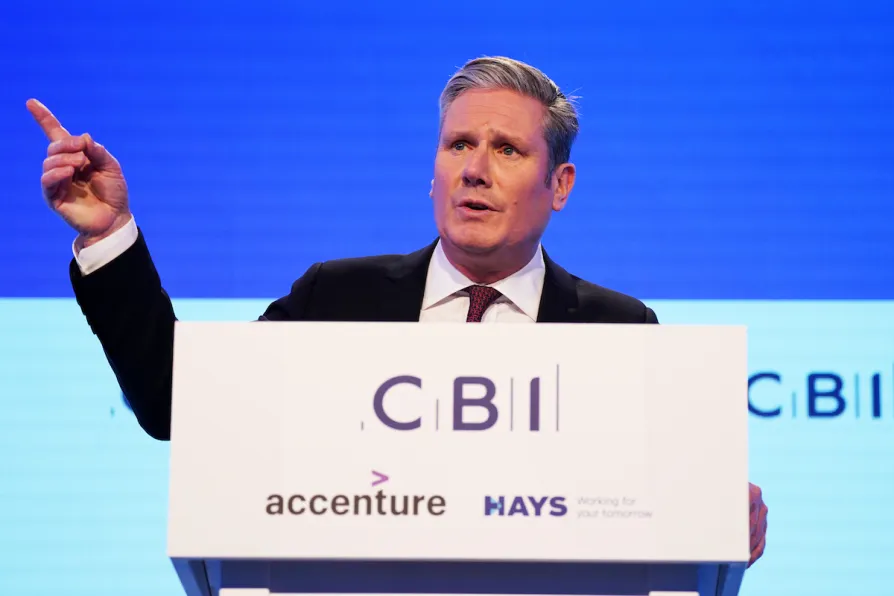
 Labour Party leader Sir Keir Starmer delivers a speech during the Confederation of British Industry (CBI) annual conference at the Vox Conference Centre in Birmingham. Picture date: Tuesday November 22, 2022.
Labour Party leader Sir Keir Starmer delivers a speech during the Confederation of British Industry (CBI) annual conference at the Vox Conference Centre in Birmingham. Picture date: Tuesday November 22, 2022.
RISHI SUNAK and Keir Starmer’s addresses to the Confederation of British Industry (CBI) underline how little there is to distinguish them.
Somehow immigration has emerged as the headline issue facing Britain’s economy.
Not catastrophic inflation threatening millions of households with poverty and tens of thousands of small to medium-sized businesses with bankruptcy.
Certainly not the key cause of that inflation that is rising profit margins for big business. Or the pressure facing underfunded public services.
Sunak’s “number one priority” is cracking down on illegal immigration, he says, while people struggle to pay for the weekly shop.
Starmer wants to “help the British economy off its immigration dependency.”
It’s true that CBI chiefs only want immigration rules relaxed so they can import labour without worrying about investing in training or raising pay.
Dependence on super-exploited foreign labour in certain sectors is obvious.
Even EU “free movement” could not lure people to the appalling living and working conditions forced on seasonal agricultural workers: in 2013, when restrictions on employing Romanian and Bulgarian workers in Britain came to an end, farm lobbyists demanded that the seasonal agricultural workers scheme be extended to non-EU Ukraine.
Though unstated, the subtext that much seasonal farm work is bonded labour was clear: employers did not want workers with an unrestricted right to work in Britain, who would be free to seek alternative work.
Workers can pay thousands for places on these schemes and be forced to stay put and work off the debt. Many are trapped in substandard accommodation or forced to meet inhuman work quotas.
When bosses lament fruit “rotting in the fields” and a liberal media blames Brexit, socialists should be clear that the sector’s recruitment problems are tied to pay, working and living conditions no worker should have to accept.
In other sectors — haulage, for instance — businesses geared to short-term profit to maximise dividends have avoided training the workers of the future for years, assuming the availability of trained workers from abroad. So it is right to confront employers with the need to raise pay and train staff.
Counterposing the business case for cheap labour with Sunak and Starmer’s hostility to immigrants is not a productive exercise. Britain’s approach has long combined racist brutality towards “illegal immigrants” with the super-exploitation of foreign workers. And by making it harder for immigrant workers to report abuses or organise, the “hostile environment” perpetuates the core issues of poor pay and conditions.
The solutions require a joined-up approach completely absent from Starmer. He calls for higher pay, but refuses to support workers striking for it: and declines to commit to essential pay rises in public services like the NHS. Nor can seasonal farm work be made an attractive option without a public transport infrastructure that gives freer access to work sites (and the ability to leave them at will).
Starmer boasted to the bosses that he has turned Labour “inside out” and “united my party” (he frequently refers to it as his property, “my Labour Party”) in support for business.
The unity he has enforced is based on bans and expulsions: Starmer has not won arguments within Labour, since he stood on a false prospectus and has outlawed debate.
But the bigger problem is that Labour has turned away from the radical reforms that the deep-rooted social, economic and ecological crises we face demand.
Its timidity is reflected in Starmer’s reference to a difficult economic outlook as a reason not to proceed with unspecified “good Labour things” in government (unions banking on a more sympathetic ear on pay or union rights, look out).
Tony Benn once said that “the crisis we inherit … will be the occasion for fundamental change and not the excuse for postponing it.”
Today’s crises cry out for fundamental change. But whether on immigration or economics, the Conservatives and Labour are united in opposing that.

As Starmer flies to Albania seeking deportation camps while praising Giorgia Meloni, KEVIN OVENDEN warns that without massive campaigns rejecting this new overt government xenophobia, Britain faces a soaring hard right and emboldened fascist thugs on the streets

The left must avoid shouting ‘racist’ and explain that the socialist alternative would benefit all












